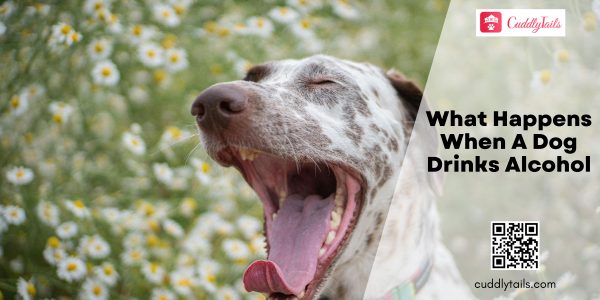What Happens When A Dog Drinks Alcohol
Alcohol toxicity in dogs is a serious and potentially life-threatening condition that can result from accidental ingestion of alcoholic substances. Understanding the signs and symptoms, and also how to react after a dog drinks alcohol, is crucial for prompt intervention and treatment.
What Happens After A Dog Drinks Alcohol
While some humans may enjoy a glass of wine or a beer, dogs lack the enzymes to metabolize alcohol effectively. This means even a small amount of alcohol can be toxic to them. Alcohol poisoning in dogs can occur when they accidentally ingest alcoholic beverages, household items containing alcohol, or even fermented foods.
Common Sources of Alcohol Poisoning for Dogs
Fermented Foods
Bread dough, rotten fruits, and fermented dairy products can produce ethanol, leading to intoxication.
Rubbing Alcohol and Antiseptics
Isopropyl alcohol, found in rubbing alcohol and disinfectants, is even more toxic than ethanol.
Alcoholic Beverages
Beer, wine, liquor, and cocktails contain ethanol, which is toxic to dogs.
Household Products
Many household items, such as mouthwash, hand sanitizers, cough syrups, perfumes, and cleaning agents, contain alcohol.
Signs To Watch Out For After Dog Drinks Alcohol
Physical Symptoms
If your dog has consumed alcohol, you might notice symptoms like vomiting, diarrhea, difficulty breathing, staggering, and even seizures.
Behavioral Changes
Alcohol poisoning can also cause changes in behavior. Your usually happy-go-lucky pup might become lethargic, disoriented, or agitated. Think of it as the equivalent of your dog’s worst hangover ever.
What To Do If A Dog Drinks Alcohol
Immediate Actions
If you catch your dog in the act or suspect they’ve ingested alcohol, remove the source of alcohol. Check for signs of distress in your dog and call a vet quickly. Make a note of what product your dog was exposed to and how much he consumed. If you can, bring the packaging of that product with you to the vet. Remember, never try to induce vomiting at home.
Supportive Care
Once at the vet, your dog may need supportive care like intravenous fluids to prevent dehydration and help flush out the toxins. They might also perform some blood tests and X-rays to get a better idea.
Monitoring and Follow-Up
After initial treatment, your vet will likely recommend monitoring your dog closely for any lingering symptoms or complications. Follow their instructions diligently to ensure your furry friend makes a full recovery.
Prevention and Safety Measures for Dog Owners
Securely Storing Alcohol
Dogs are known for their curious nature and may be inclined to investigate a spilled drink or improperly stored alcoholic beverages. Consider storing all alcohol in locked cabinets or out-of-reach areas to prevent any accidental ingestion.
Avoiding Alcohol Exposure
As much as we love to unwind with a cold beer or a cocktail, it’s important to remember that alcohol can be toxic to dogs. Be mindful of where you place your drinks during gatherings or parties, ensuring that your pup can’t sneak a sip when you’re not looking. In addition, be cautious when using products that contain alcohol, such as certain cleaning solutions, and make sure they are kept away from your furry friend.
Conclusion
Alcohol toxicity in dogs is a medical emergency that requires immediate action. Even small amounts can cause serious health complications, so pet owners must be vigilant in preventing exposure. If your dog accidentally consumes alcohol, seek veterinary care immediately to ensure the best chance of recovery.
Frequently Asked Questions (FAQs)
How much alcohol is toxic to a dog?
Even a small amount of alcohol can be toxic to a dog, especially for smaller breeds. As little as 0.5-1 mL per pound of body weight can cause poisoning.
Can dogs recover from alcohol poisoning?
Yes, with prompt veterinary treatment, most dogs recover. However, severe cases can lead to long-term complications or even death.
How long does alcohol stay in a dog’s system?
Alcohol is metabolized within a few hours, but symptoms can last longer depending on the amount ingested and the dog’s overall health.
What should I do if my dog accidentally licks alcohol?
If your dog only licked a small amount, monitor for symptoms. If they ingested more, contact a veterinarian immediately.
Are all types of alcohol toxic to dogs?
Yes, all forms of alcohol—including ethanol, isopropyl alcohol (rubbing alcohol), and methanol—are toxic to dogs and should be avoided.

